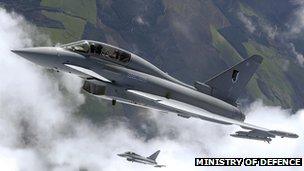Should we cheer for the EADS/BAE merger?
- Published
- comments

BAE systems is currently Britain's largest defence contractor
When we are beating the Americans, all of a sudden the British feel very European. That is the implication of the day of national celebration that seems to have been triggered by Europe's against-the-odds triumph in the Ryder Cup.
And of course when the continent and its eurozone is in a financial and economic mess, we congratulate ourselves on retaining British national identity and sterling, rather than the battered euro.
How does the planned merger of our largest manufacturer and defence contractor, BAE Systems, with Franco-German EADS - maker of Airbuses - fit into our complicated sense of our national interests and who we are?
BAE and EADS see themselves as trying to forge the equivalent of our victorious golfing squad. They want to become Europe's Boeing, by creating a vast hi-tech conglomerate split 50:50 between defence and civil operations.
The commercial rationale goes like this. For BAE, it is about lessening the impact of a massive squeeze by the UK and US on defence spending, helping EADS to improve the profit margins on its own smaller defence business and securing access to the billions of euros in EADS's coffers (the combined group would have 18bn euros of net cash, I am told) for deployment in research and development.
For EADS, the primary motive of the chief executive, Tom Enders, appears to be to depoliticise his company - by securing the agreement of the German and French governments to end their control over the company and behave like normal investors.
Critics of the deal see it differently: they fear a sprawling, too complicated, bureaucratic global monster will be created through the 34bn euro merger, too subject to interference by profit-destroying French and German ministers; and in the process vital British intellectual property would become shared with competitor economies, UK jobs would be at risk and Britain's defence would become more and dangerously dependent on overseas suppliers.
Here's the problem: it is impossible to adjudicate definitively between these views, because much depends on whether the French and German governments are ultimately prepared to let EADS/BAE evolve into as normal a commercial business as is possible for a company in defence and so dependent on government contracts.
On a knife edge
Right now the auguries are mixed. The French and German governments seem prepared to abandon their formal agreements that give them direct control over EADS. But their insistence on shareholdings of at least 9% each in the enlarged group, and perhaps more, speaks to a reluctance to let go.
As it happens, if France and Germany are ultimately unprepared to give the company its freedom, all the above becomes irrelevant - because the US government, which is BAE's biggest customer and would even be the biggest customer of EADS/BAE, would blow up the merger by making it clear that it would no longer be prepared to award sensitive contracts to the new corporate monster.
Right now this deal is on a knife edge and could go either way. On the margin, I think it is likely that France and Germany will cede enough ground to let it proceed - because if the marriage were called off, BAE would then become very vulnerable to being taken over by another business, having publicly admitted that it is strategically challenged.
The acquirer of BAE in those circumstances would almost certainly be a US defence giant such as Lockheed or Boeing itself. That would reinforce America's control of the global defence industry and leave Europe looking as though it might never again win the industrial equivalent of the Ryder Cup.